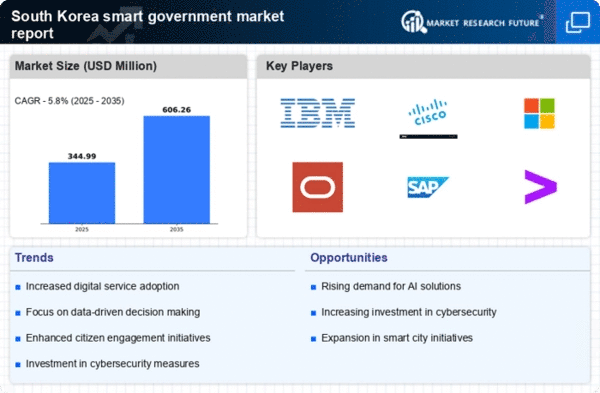Rising Urbanization Trends
Urbanization is a significant driver impacting the smart government market in South Korea. With over 80% of the population residing in urban areas, the demand for efficient public services is paramount. This urban growth necessitates the implementation of smart solutions to address challenges such as traffic congestion, waste management, and public safety. The smart government market is responding to these needs by developing integrated urban management systems that leverage data analytics and IoT technologies. For instance, smart city initiatives are projected to enhance public safety by 25% through improved surveillance and emergency response systems. As urbanization continues to rise, the smart government market is likely to see increased investment and innovation aimed at creating livable and sustainable cities.
Focus on Sustainable Development
Sustainability is becoming a crucial focus for governments worldwide, and South Korea is no exception. The smart government market is increasingly influenced by initiatives aimed at promoting sustainable development. The South Korean government has set ambitious goals to reduce greenhouse gas emissions by 40% by 2030, which necessitates the adoption of smart technologies. For example, smart energy management systems are being implemented to optimize energy consumption in public buildings, potentially reducing costs by 20%. Additionally, the integration of smart waste management solutions is expected to enhance recycling rates and reduce landfill usage. As sustainability becomes a priority, the smart government market is likely to expand, driven by the need for innovative solutions that align with environmental goals.
Increased Demand for Transparency
There is a growing demand for transparency in government operations, which significantly influences the smart government market. Citizens in South Korea are increasingly advocating for open data initiatives and accountability in public spending. This trend is reflected in the government's commitment to enhancing transparency through digital platforms, allowing citizens to access information regarding budgets, expenditures, and project statuses. The smart government market is expected to benefit from this shift, as transparency fosters trust and encourages civic participation. Reports indicate that 70% of citizens prefer to engage with government services that provide clear and accessible information. Consequently, the emphasis on transparency is likely to drive the adoption of smart technologies that facilitate open governance.
Government Policy and Regulation Support
Supportive government policies and regulations play a pivotal role in shaping the smart government market. In South Korea, the government has established various frameworks to promote the adoption of smart technologies across public sectors. Initiatives such as the Smart City Act and the Digital New Deal are designed to encourage innovation and investment in smart solutions. These policies not only provide funding opportunities but also create a conducive environment for public-private partnerships. The smart government market is expected to thrive as regulatory support fosters collaboration between government entities and technology providers. With an estimated investment of $10 billion in smart city projects by 2025, the regulatory landscape is likely to propel the market forward, ensuring that smart solutions are effectively integrated into public governance.
Technological Advancements in Infrastructure
The rapid evolution of technology is a primary driver for the smart government market. In South Korea, advancements in infrastructure, such as the deployment of 5G networks and IoT devices, facilitate enhanced connectivity and data exchange. This technological landscape enables government agencies to implement smart solutions that improve public services and operational efficiency. For instance, the integration of smart traffic management systems has been shown to reduce congestion by up to 30%, thereby enhancing urban mobility. Furthermore, the smart government market is projected to grow at a compound annual growth rate (CAGR) of 15% from 2025 to 2030, driven by these technological innovations. As infrastructure continues to modernize, the potential for improved citizen engagement and service delivery becomes increasingly apparent.

















